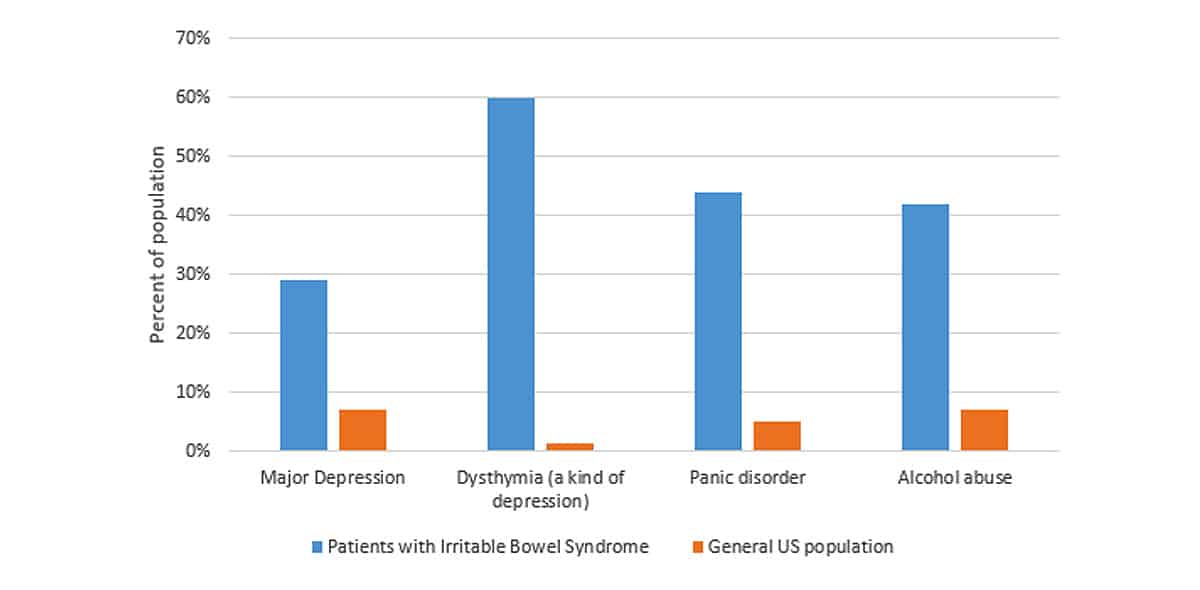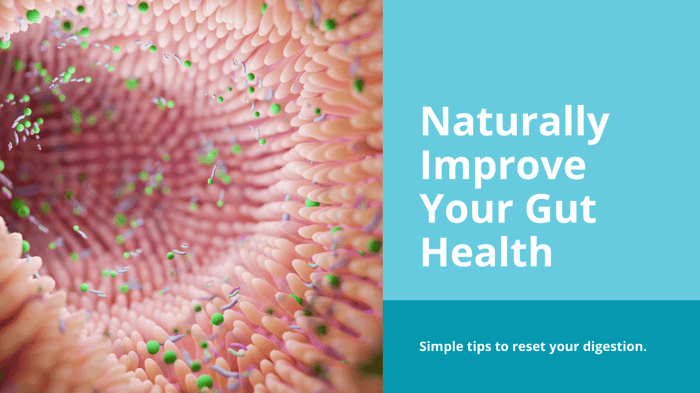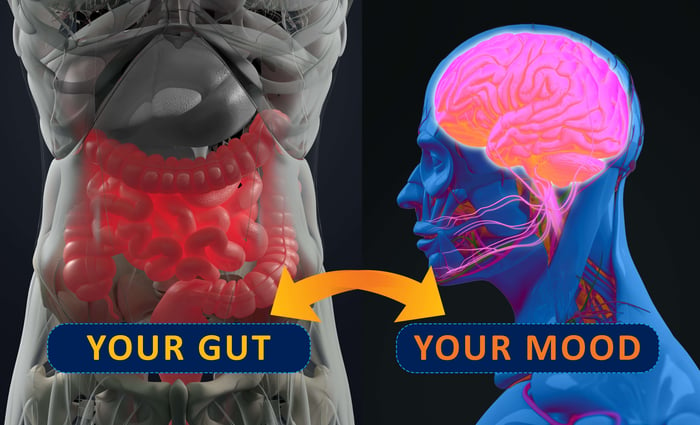Ultimately, your gut health depends on the health of the millions of tiny bacteria living in your gut microbiome. If the good bacteria outnumber the bad bacteria in the gut, your gut health will be pretty great. But if the bad bacteria go rogue and overpower the good guys… It won’t go unnoticed.
Thankfully, improving gut health isn’t difficult. But it does require some effort and, most importantly, consistency. Boosting your digestive system isn’t something you just do once. It needs to be maintained over time in order for your overall health to improve.
So… Why do we need to take extra care of our gut microbiota and how exactly do we do it? Here’s our advice on getting your digestive system back in order and keeping it there for the long haul.
The Consequences of Poor Gut Health
Gut health is a subtle thing. If you’ve got a headache, you notice it immediately and either push through or take something to make it feel better. But gut health is a little trickier than that.
Most of us don’t even notice when our digestive health is poor. The signs aren’t always huge and drastic, which means we can accidentally allow our system to get into bad shape before we even notice.
So what are the consequences of poor gut health? Interestingly, it can extend to far more than just your digestive system!
Increased Risk of Health Conditions
Obviously, poor gut health can increase your risk of developing stomach and intestine disorders. Things like irritable bowel syndrome (IBS), diverticulitis, and acid reflux can start to become everyday issues.
But even worse than that, poor gut health can lead to bigger problems down the line, one of the most prominent being type 2 diabetes. This is often as a result of feeding your gut bacteria the wrong things, which causes your blood sugar to go out of whack, leaving you with unpleasant symptoms.
The good news is when you know how to improve gut health, everything else improves too. So yes, by improving your gut, you can actually reverse diabetes!
The Best Synbiotic Combo: Click Here Now to Check It Out
Lowered Immune System
Your immune system health is very linked to your gut health. Poor gut health naturally leads to strain on the immune system, which has a knock-on effect on the rest of your body.
You may find that you’re more prone to sniffles or you catch colds more easily. Perhaps you feel unusually fatigued and rundown. All of this leads back to the immune system, which is adversely affected by your poor gut health.
Increased Risk of Obesity
Yes, bad bacteria can make you fat! When the bad bacteria in your gut outnumbers the bad, your digestive system is strained. This means your system struggles to absorb nutrients properly and your metabolism becomes sluggish… Both in terms of expending energy and dealing with food!
Which means, if your gut health isn't on point, it becomes easy to pack on the pounds and exponentially more difficult to get rid of them.
Poor Mental Health
Did you know that a large percentage of serotonin—the “happy hormone”—is produced in the gut rather than the brain? That means your gut microbiome has a direct impact on your mental health!
The more bad bacteria lurking around, the less happy hormone is produced. Research suggests that mental health issues such as depression, anxiety, mood swings, and cognitive decline can all be traced back to bad gut health.
So if you want better mental health, one big step you can take is to improve your gut health!

Simple Tips To Improve Gut Health
So we now know that the key to managing your physical health, immune system, and mental health is learning how to improve gut health.
How do you go about doing that? We’ve put together a list of steps you can take to promote the growth of good bacteria. Implement these into your daily life, stay consistent, and you’ll start to see positive changes.
It’s important that you know that change won’t happen overnight! The biggest mistake people make when it comes to fixing poor gut health is being impatient. Stick to these steps for 3 months and we can guarantee, you’ll feel better, look better, think more clearly, and never want to go back!
1. Take a Probiotic
Taking probiotic supplements regularly is one of the best ways to fix a disrupted gut microbiome, promote the growth of good bacteria, and maintain a state of harmony in your digestive system.
It’s quick, easy, and effective. We recommend asking your doctor what probiotic supplements they recommend, as they vary greatly in the number of CFUs (colony-forming units) they provide.
But this is the quickest way to give your digestive system a head start, and a great foundation to build on!
2. Fix Your Diet

Ah, the food question. Yes, there are rules to follow when it comes to maintaining great gut health. You may have to make sacrifices. But we can promise if you stick to a healthy diet for 3 months and start feeling the difference, you’ll be less inclined to go back to junk food.
Here’s our advice for changing up your diet.
3. Stop: Doing Fad Diets
Everyone wants to lose weight fast, and there are hundreds of different diets out there that promise to help you do just that. The problem? Most of them do damage along with dropping the weight.
Rather than jumping on the bandwagon, making some simple changes to your diet can have positive long-term effects on both your weight and your health. Patience is key here—you may not shed the weight as fast as you would on a fad diet, but you’ll do it much more safely this way.
4. Stop: Eating Processed Foods
Processed foods are linked to multiple diseases and disorders, including gut conditions. Not only do they contain a variety of unhealthy ingredients designed to extend their shelf life, but it’s also practically impossible to tell what exactly has gone into it. Which means you actually don’t know what you’re subjecting your gut to.
Processed foods are often also very high in calories. Between eating excess calories and your gut not being able to absorb nutrients properly… Eating processed foods just isn’t worth it!
5. Do: Try a Plant-Based Diet
Current research indicates that a plant-based diet can be effective for promoting a diverse microbiome. The nutrients in plant-based foods are more readily absorbed by the body, so a vegan or vegetarian diet can take some strain off your digestive system.
If you don’t want to go entirely plant-based, try sticking to lean chicken, turkey, and fish for a few months and forgoing the red meat. But you can eat a full, well-rounded plant-based diet loaded with whole grains, fruits, and vegetables and still feel full and healthy!
6. Do: Eat More Fermented Foods
Fermented foods are excellent for the gut! Studies show that consuming fermented foods and drinks like yogurt, kimchi, sauerkraut, kombucha, and kefir promotes the growth of good bacteria, encourages a diverse microbiome, and improves gut health.
Try and get in one fermented food option per day and you’ll start to see (and feel) the difference in your gut!
Brand New: The Best (Doctor-Recommended) Probiotic on the Market
7. Get Some Exercise
We all know that exercise helps us drop weight, build muscle, and look and feel better. But did you know that it can boost your gut health?
You don’t need to go all out and join the gym if you don’t want to. Just taking a walk around the block every day can have hugely beneficial effects on your gut… As well as your body composition, cardiovascular health, and self-confidence!
8. Meditate
We know it’s not easy to lower stress. But while you can’t just quit your job and move to an island, we strongly encourage you to take stock of your life and see where you can reduce stressors in your life.
Meditation offers a wide range of benefits for gut health, including reducing stress levels, regulating the gut-brain axis, improving gut microbiota, and decreasing anxiety and depression.
Meditation has been shown to have a positive impact on gut health in several ways:
-
Reducing Stress: Chronic stress can disrupt the gut-brain axis and lead to a range of digestive problems, including irritable bowel syndrome (IBS), inflammatory bowel disease (IBD), and leaky gut syndrome. Meditation can help reduce stress levels, which in turn can improve gut health.
-
Regulating the gut-brain axis: Meditation has been shown to regulate the gut-brain axis, which is the communication pathway between the gut and the brain. By regulating this pathway, meditation can improve gut health by reducing inflammation, regulating gut motility, and improving gut permeability.
-
Improving gut microbiome: The gut microbiome, which is made up of bacteria, yeast, and other microorganisms, plays a crucial role in gut health. Meditation has been shown to positively impact the gut microbiome by reducing inflammation, promoting the growth of beneficial bacteria, and improving gut permeability.
-
Decreasing anxiety and depression: Anxiety and depression can contribute to digestive problems. Meditation has been shown to help reduce symptoms of anxiety and depression, which can in turn improve gut health.
9. Go Easy On the Alcohol
Alcohol can affect the composition of the bacterial balance in your gut, as well as causing large amounts of inflammation in the digestive system. As you can imagine, both of these are bad news for gut health!
We’re not saying you need to give it up entirely, but be aware that drinking alcohol can have negative effects on your digestive health. If you can give it up, great! If not, then we recommend limiting yourself to a drink or two a week, and certainly no more than 2 in one sitting!
It's important to note that while all of these has been shown to have a positive impact on gut health, it's not a substitute for proper medical treatment and a healthy lifestyle. It's always a good idea to consult with a healthcare professional before starting any new health regimen.
10. Try Fasting For Gut Health
Fasting has a profound impact on gut health, serving as a reset button for your gut bacteria. When you fast, you give your digestive system a break, allowing it to focus on balancing the gut microbiome. This can lead to improved digestion, reduced inflammation, and enhanced nutrient absorption. Studies have shown that fasting can positively alter the gut microbiota, leading to a healthier gut environment. This, in turn, can have cascading benefits on your overall health, from improved immune function to better mental well-being.
Check Out Our Introduction to Fasting Guide
Ready to Jumpstart Your Journey to Better Gut Health?
You've learned about the natural ways to improve your gut health, but why not give it an extra boost? Try Total Gut Revive today and experience the difference it can make in your digestive wellness journey. Don't just read about better gut health—live it!
👉 Click Here to Try Total Gut Revive Now





